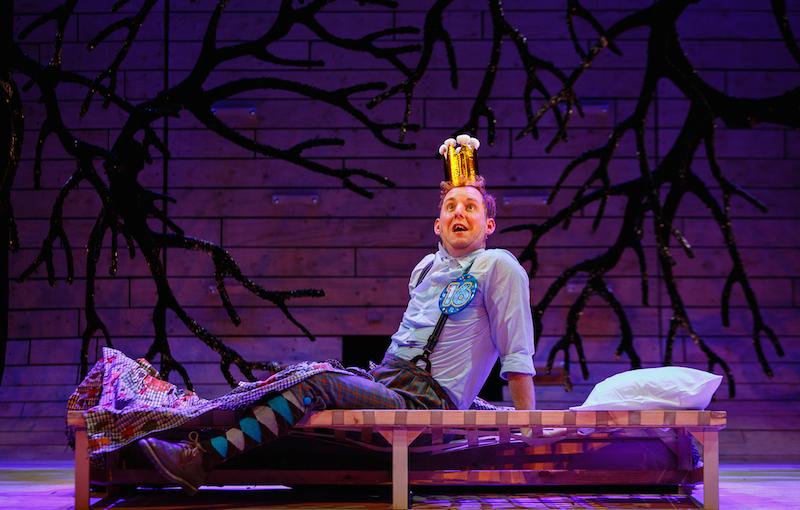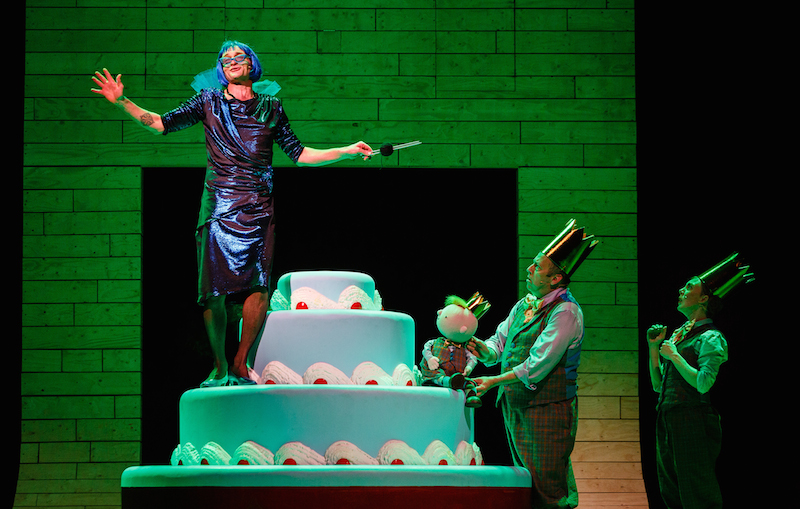Sleeping Beauty, Bristol Old Vic | reviews, news & interviews
Sleeping Beauty, Bristol Old Vic
Sleeping Beauty, Bristol Old Vic
Scintillating gender-bending version of panto classic

Christmas pantomime is all about letting go, and being carried away on a wave of communal jollity. The genre also delights in carnivalesque gender-bending, the anarchic undermining of authority and the playful representation of evil.
In post-feminist times, it makes a lot of sense to have a rather sensitive and boyish prince (David Emmings) as the Beauty, who is eventually kissed back to life by a black backpacker of a tom-boy (Kezrena James). And there isn’t just one dame, but a bevy of cross-dressing wise women, who wave their knitting needles when they need to work magic, an ensemble that plays with ever-renewing gusto, impersonating bouncing beavers one minute and bleeting sheep the next, in a hilarious nod to the pantomime horses of old.
In stark contrast with the good cheer and open-hearted love and generosity of the engagingly Pythonesque band of good fairies (a fun version of a committee from the WI), Stu Goodwin as Sylvia (pictured below), the embodiment of wickedness, comes on first in a dark blue lamé dress and heels, spitting camp venom and casting evil spells with a dramatic presence that almost steals the show. The one you love to hate is later transformed into a prancing Bo Peep, who has bewitched, as Circe does in the Odyssey, the good women and dames into sheep.
 The tale of Sleeping Beauty has taken many more or less sugar-coated forms, from Charles Perrault to the Brothers Grimm. The darkest version of them all has come to us through Italo Calvino’s marvellous collection of Italian folk tales. This varied tradition allows Sally Cookson and her writer Adam Peck to play fast and loose with a story that has always been characterised by several twists and turns, and reversals of fate. Prince Percy’s transformation into an oinking pig (“from puffed-up prince to porky pig”, as the song tells us merrily), is just one of several inspired inventions, true to the spirit of the tale and yet fresh and new. This process of transformation – as with other moments when evil is perpetrated – deftly combines a hint of true horror and darkness with ridicule and humour, just enough to scare the younger members of the audience, without totally freaking them out.
The tale of Sleeping Beauty has taken many more or less sugar-coated forms, from Charles Perrault to the Brothers Grimm. The darkest version of them all has come to us through Italo Calvino’s marvellous collection of Italian folk tales. This varied tradition allows Sally Cookson and her writer Adam Peck to play fast and loose with a story that has always been characterised by several twists and turns, and reversals of fate. Prince Percy’s transformation into an oinking pig (“from puffed-up prince to porky pig”, as the song tells us merrily), is just one of several inspired inventions, true to the spirit of the tale and yet fresh and new. This process of transformation – as with other moments when evil is perpetrated – deftly combines a hint of true horror and darkness with ridicule and humour, just enough to scare the younger members of the audience, without totally freaking them out.
Everything about this scintillating production works a treat: the very high quality of all the acting, a simple and versatile set, an array of colourful costumes, a carefully-judged yet very dramatic use of lighting and sound design, all contribute to keeping the show light-footed and exciting. The movement and choreography manage to combine fluency and farce. Benji Bower’s score, which ranges from anthemic deep soul to rollicking country, is played with virtuosity by a group of three talented multi-instrumentalists. The song lyrics are funny and smart: the wicked fairy is a “black magic woman, she’s coming to get you, Sylvia, she’s got issues”. So much so that, rather than disappearing into a puff of smoke or being destroyed, this manifestation of the dark side is, in some mysterious way, redeemed, and returns from her wayward ways to that good-hearted chorus of delightful women and dames who, as much as anything, hold the show together.
The result is a subtly made show about redemption, describing and inviting a re-connection with the heart and the power of love. It is to Cookson and her team’s credit that their Sleeping Beauty is both immensely entertaining as well as deeply moving. The magic doesn’t just heal the protagonists’ wounds, but works its power on us, the audience. And that, in contrast with the mostly slapstick and surface pleasure of Christmas entertainment, is a remarkable feat indeed.
- Sleeping Beauty at the Bristol Old Vic until 17 January 2016
rating
Share this article
more Theatre
 Banging Denmark, Finborough Theatre review - lively but confusing comedy of modern manners
Superb cast deliver Van Badham's anti-incel barbs and feminist wit with gusto
Banging Denmark, Finborough Theatre review - lively but confusing comedy of modern manners
Superb cast deliver Van Badham's anti-incel barbs and feminist wit with gusto
 London Tide, National Theatre review - haunting moody river blues
New play-with-songs version of Dickens’s 'Our Mutual Friend' is a panoramic Victori-noir
London Tide, National Theatre review - haunting moody river blues
New play-with-songs version of Dickens’s 'Our Mutual Friend' is a panoramic Victori-noir
 Machinal, The Old Vic review - note-perfect pity and terror
Sophie Treadwell's 1928 hard hitter gets full musical and choreographic treatment
Machinal, The Old Vic review - note-perfect pity and terror
Sophie Treadwell's 1928 hard hitter gets full musical and choreographic treatment
 An Actor Convalescing in Devon, Hampstead Theatre review - old school actor tells old school stories
Fact emerges skilfully repackaged as fiction in an affecting solo show by Richard Nelson
An Actor Convalescing in Devon, Hampstead Theatre review - old school actor tells old school stories
Fact emerges skilfully repackaged as fiction in an affecting solo show by Richard Nelson
 The Comeuppance, Almeida Theatre review - remembering high-school high jinks
Latest from American penman Branden Jacobs-Jenkins is less than the sum of its parts
The Comeuppance, Almeida Theatre review - remembering high-school high jinks
Latest from American penman Branden Jacobs-Jenkins is less than the sum of its parts
 Richard, My Richard, Theatre Royal Bury St Edmund's review - too much history, not enough drama
Philippa Gregory’s first play tries to exonerate Richard III, with mixed results
Richard, My Richard, Theatre Royal Bury St Edmund's review - too much history, not enough drama
Philippa Gregory’s first play tries to exonerate Richard III, with mixed results
 Player Kings, Noel Coward Theatre review - inventive showcase for a peerless theatrical knight
Ian McKellen's Falstaff thrives in Robert Icke's entertaining remix of the Henry IV plays
Player Kings, Noel Coward Theatre review - inventive showcase for a peerless theatrical knight
Ian McKellen's Falstaff thrives in Robert Icke's entertaining remix of the Henry IV plays
 Cassie and the Lights, Southwark Playhouse review - powerful, affecting, beautifully acted tale of three sisters in care
Heart-rending chronicle of difficult, damaged lives that refuses to provide glib answers
Cassie and the Lights, Southwark Playhouse review - powerful, affecting, beautifully acted tale of three sisters in care
Heart-rending chronicle of difficult, damaged lives that refuses to provide glib answers
 Gunter, Royal Court review - jolly tale of witchcraft and misogyny
A five-women team spell out a feminist message with humour and strong singing
Gunter, Royal Court review - jolly tale of witchcraft and misogyny
A five-women team spell out a feminist message with humour and strong singing
 First Person: actor Paul Jesson on survival, strength, and the healing potential of art
Olivier Award-winner explains how Richard Nelson came to write a solo play for him
First Person: actor Paul Jesson on survival, strength, and the healing potential of art
Olivier Award-winner explains how Richard Nelson came to write a solo play for him
 Underdog: the Other, Other Brontë, National Theatre review - enjoyably comic if caricatured sibling rivalry
Gemma Whelan discovers a mean streak under Charlotte's respectable bonnet
Underdog: the Other, Other Brontë, National Theatre review - enjoyably comic if caricatured sibling rivalry
Gemma Whelan discovers a mean streak under Charlotte's respectable bonnet
 Long Day's Journey Into Night, Wyndham's Theatre review - O'Neill masterwork is once again driven by its Mary
Patricia Clarkson powers the latest iteration of this great, grievous American drama
Long Day's Journey Into Night, Wyndham's Theatre review - O'Neill masterwork is once again driven by its Mary
Patricia Clarkson powers the latest iteration of this great, grievous American drama

Add comment